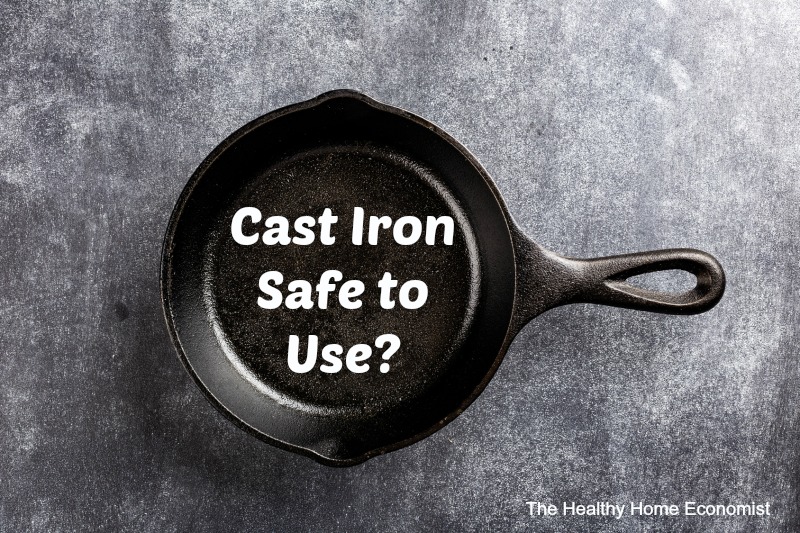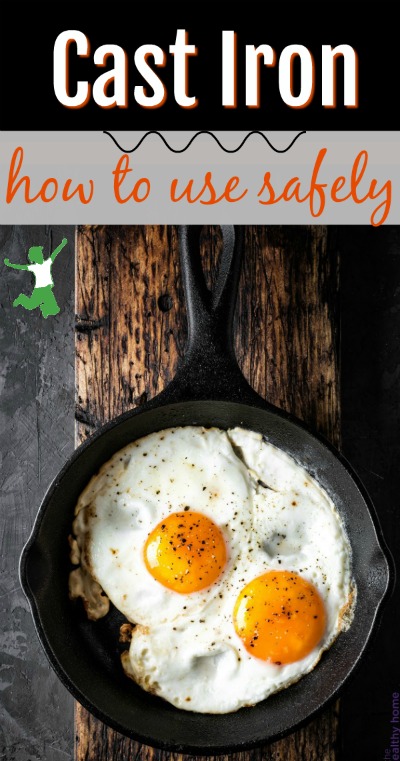Using cast iron for cooking presents a little known but serious health risk particularly for middle-aged men and menopausal women. How to avoid this issue and use safely! 
Given the amount of time I spend in the kitchen preparing meals for my family, you might be surprised to learn that I do not own any cast iron pans. What’s more, I don’t intend to purchase or use cast iron anytime in the future (I choose to cook in toxin-free, traditional clay pots).
This may seem like heresy particularly since cast iron skillets are almost universally considered to be a healthy and durable choice for the preparation of homecooked meals.
However, I have good reasons for my decision, and science bears out my serious concerns about using cast iron pans unless they also include a quality enamel layer to prevent contact of the food with the iron surface.
Excess Iron is a Health Hazard
My primary reason for opting out of cast iron revolves around the health problems caused by excess iron in the diet. Research has demonstrated that cooking with iron pots and pans significantly raises iron levels in food. Correspondingly, the iron levels of those who eat that food increase as well. (1, 2)
Women do not typically need to worry about this problem as long as they are menstruating. The monthly cycle is a protective factor against this condition. Growing children also are not particularly susceptible as growth obviously requires more blood and more iron.
Adult Men and Menopausal Women Most at Risk
However, for adult men (even fully grown young men) and menopausal women, cast iron can definitely pose a problem as the iron that naturally gets into food from the utilization of this type of cookware can result in iron rising to toxic levels. This condition is associated with a host of serious health problems.
Iron is one of the few minerals we cannot eliminate except through blood loss. Therefore supplements should never contain iron. Moreover, cooking with cast iron is a questionable choice for this segment of the population.
Most people view iron as a nutrient, and indeed it is. It is also a powerful agent of oxidation in the body. This means that excess iron increases the chances of cancer and can severely damage the heart, arteries, and other organs.
In addition, persons with an inherited condition called hemochromatosis, or iron overload disease, can be especially harmed from iron intake. If you have any family members with this condition (about 1 million Americans), you should be especially careful with sources of iron in your diet.
Iron Overload Symptoms
Unfortunately, the symptoms of iron overload are similar to those of other conditions. Therefore it may be wise to request a transferrin saturation test at your next check-up to eliminate iron as a potential source of your health woes.
Avoiding cast iron is particularly important if you suffer from any of the following conditions and/or are an adult male or menopausal female:
- Fatigue
- Joint or muscle weakness
- Mysterious stomach or other gastrointestinal pain/nausea
- Weight loss that cannot be explained
- Elevated liver enzymes
- Shortness of breath
- Early menopause
- Loss of sex drive
- Impotence
- Loss of body hair (this is also a symptom of adrenal fatigue)
Later stage symptoms of iron toxicity
If iron overload continues for extended periods of time, more serious symptoms can emerge such as the following.
- Greying or bronzing of the skin
- Blood sugar issues
- Irregular heartbeat
- Liver problems
- Arthritis
How to Resolve Iron Overload Quickly
If you’ve been cooking with cast iron for a long time and are an adult male or menopausal female, it might be wise to donate blood right away. This practice will reduce iron stores immediately. Remember, loss of blood is the only way to resolve iron toxicity problems.
Continue regular blood donation until you can completely switch over to another type of nontoxic cookware such as clay, enamel, glass, or titanium.
Anemia Usually from an Imbalanced Gut NOT Inadequate Iron
Believe it or not, there is plenty of iron in the diet of the typical American. Even those eating the horrific Standard American Diet need not worry about inadequate iron intake. In addition, there is almost certainly adequate iron intake for a person eating a diet based on traditional foods and also in the diets of vegetarians.
Therefore, if you are anemic or suffer from pregnancy anemia and feel the need to use cast iron to increase your iron levels, you may wish to consider an imbalanced gut as a more likely source of the problem. Common gut pathogens consume iron and are a frequent cause of anemia. These pathogens include Actinomyces spp., Mycobacterium spp., pathogenic strains of E. coli, Corynebacterium spp., along with many others. Previous use of the birth control pill or antibiotics makes one especially prone to anemia issues.
Unfortunately, increasing iron intake with cast iron only makes these iron loving pathogens grow stronger. It does little to remedy anemia over the long haul. Therefore, rebalancing the gut with beneficial bacterial strains through diet and lifestyle changes rather than use of cast iron or iron supplements is the best approach to solving the root of the problem.
Using Cast Iron Safely
As mentioned above, using enameled cast iron is a safe option if you prefer the ease of use and heavy feel of cast iron pans. The enameled layer protects the food from contact with the iron portion of the pan and hence, offers an option that is both practical and safe. I recommend Le Creuset cookware as one of the best quality brands on the market if this is something you wish to explore.
It’s not just cast iron that is a potential health hazard. Learning to use stainless steel cookware, aluminum bakeware, and other kitchen equipment safely is of paramount importance for the modern cook. It’s not just about the food. Preparation is very important too to avoid the introduction of unwanted toxins!

References
(1) Food prepared in iron cooking pots as an intervention for reducing iron deficiency anemia
(2) Iron Content of Food Cooked in Iron Utensils
(3) Excess Iron: A Health Risk?
(4) Gut and Psychology Syndrome







This is simply ridiculous. Where is the evidence that cast iron causes excess iron levels? You are telling me that my 60 year old cast iron is causing elevated iron? If it was sloughing off iron into the food at any noticeable rate, the pans would have worn to nubs by now.
The writer seems to forget that cast iron pans have a barrier between them and the food they cook. This barrier is what is known to cast iron cooks as “seasoning”. It is what gives the pan it’s non-stick properties and protects the pan from oxidation.
More blogs from HHE = more assumptions.
Actually, if you re-read the article, you will note that two studies are cited that found that eating food cooked in iron skillets and other iron utensils significantly raise blood iron levels.
Can you recommend a brand of clay pots?
This is the brand I use. https://www.thehealthyhomeeconomist.com/resources/#19
l completely agree with Mark Heitchue and with the contents of this article, except: “stainless” steel is NOT safe, because it leaches nickel and chrome, which are both even more toxic than iron. Aluminum cookware is even worse, because of the glyphosate in our blood and in our environment. 97% of Americans have detectable levels of Glyphosate in their blood. Please look up the work of Dr. Stephanie Seneff (MIT) on the connection between aluminum, glyphosate and autism, diabetes (!) and other chronic disease.
Sarah,
I am very newly diagnosed with HHC, so I am very grateful for all of your correct information, that my doctor has already informed me of as well. As you are well aware of, there can be extremely horrific side effects of iron overload.
For those of you who can tolerate excess iron, count yourself blessed that you don’t have to ever worry about an MRI revealing that your brain has begun to atrophy due to the fact your liver has basically been destroyed from too much iron.
Sarah, keep up your hard work, and my prayers to you that you and your family remain healthy from iron overload for their entire lives.
I season properly and do not use them more than 3 times a month as I am mainly raw diet. I have slowly switched to ceramic but also had relatives that lived into their 90s that used iron pans everyday.
Yes, of course. Some people have no trouble with extra iron in the diet. Some do, though, and unless you know for sure that you are a person that can handle it ok, then best to err on the safe side.
I appreciate your thoughtful and well researched article. There is always more to learn, and there will apparently always be individuals who post knee jerk comments. Your content is often way more informed than many many of the self proclaimed bloggers that are just now learning and then reporting information that is shallow and lacking context. You were one of the first quality resources I found online after I began my whole foods/GAPS/WAPF/stone age/wild foods lifestyle to recover from being chronically sick and then many years bed bound. I am up and about in part due to your hard work and very informative videos. Thank You! Be. Well.
What you fail to mention is, properly seasoned cast iron limits the amount of potential iron exposure one might have in cooking with these pans.
Maybe I’m missing something, but isn’t the enamel on the OUTSIDE of the Le Creuset cookware you linked, not on the surfaces that come into contact with the food?
My grand mother only used cast iron pots and pans her entire life. I gues this is why my grand parents only lived to 96 and 97.
My Dietian graduated from tufts university and has me using cast iron skillet and lucky iron fish. I use them once or twice a week. I am being treated for low RBC and low hemoglobin. I also a a Dr of hematology involved who has diagnosed me as slightly anemic. What are your thoughts on once a week? My next CBC is in November.